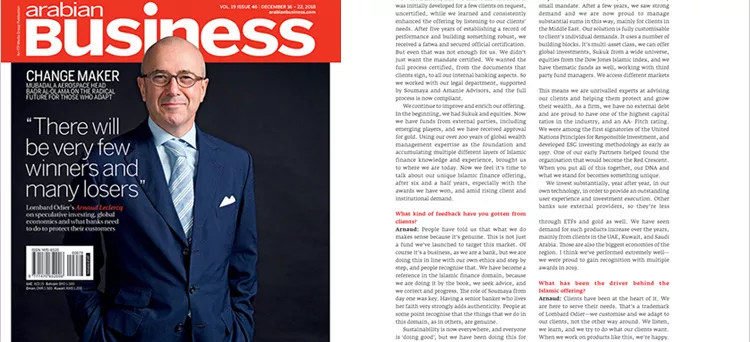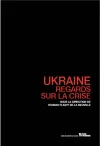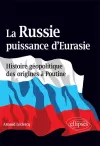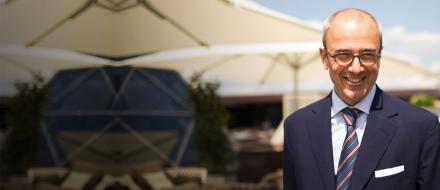Swiss role: Arnaud Leclercq shares his private banking priorities
Arnaud Leclercq, Capital Partner at Lombard Odier, says why the Swiss private bank's services focus on what really matters: the clients it serves
Rarely does a banker personally know two to three generations of the families he services, the private details of their dynasties, and all while being entrusted with sensitive information to which even some inner-circle members aren’t privy.
“We are the most trusted advisor to our clients, often over generations, and in this capacity we have access to privileged information regarding all aspects of our client’s lives,” Arnaud Leclercq, Capital Partner and Group Managing Director of Lombard Odier, tells Arabian Business.
Lombard Odier’s status as a family-owned business for seven generations has helped it win clientele from some of the most affluent families, entrepreneurs, and private investors in the GCC, as it helps to preserve, grow and transmit their assets over time. Leclercq, who is in charge of emerging markets, says Lombard Odier applies to its clients the same family principles that have driven its own business since its foundation: integrity, responsibility and long-term vision.
“There are a lot of common values,” explains Leclercq. “When you run a family-owned business for several generations you understand the challenges, you know the difficulties, so when you talk to people who are basically thinking the same way the bond is already there to start the relationship.”
The global wealth and asset manager, headquartered in Geneva since 1796, has total client assets of $281bn. In the UAE and GCC market, Lombard Odier has seen a consistent and significant growth of their business and client base for the past decade. While Leclercq insists this region has high potential, presenting many opportunities for growth, he’s discreet when asked about the total value of client assets the firm currently manages here.
“We don’t break-down our figures by individual markets,” answers Leclercq. “We prefer to focus on our clients and their needs, but we are pleased to state that it represents a significant percentage of the overall assets ($281bn) that clients around the world entrust us with. I am focused on continuing this success story but we’re not there yet. By working hard and staying close to our clients we have more than doubled our assets over the last six years.”
When you run a family-owned business for several generations you understand the challenges
Selective growth
While Lombard has 27 offices in 23 jurisdictions, Leclercq is quick to point out that these numbers aren’t necessarily growth indicators, especially in the GCC where expansion largely depends on a firm’s ability to earn the trust of prominent families.
“When we talk about growth it’s not necessarily about opening many offices,” Leclercq clarifies. “It’s essentially about us gaining the trust and getting greater access to a larger number of local wealthy families. By further collaborating and providing our services to the key families, merchant families and some royals in the region, we expand.”
These prominent families usually have several accounts in various banks, including retail, commercial, and investment institutions. While Leclercq concedes that the former two are useful and necessary, he says these families expect a different level of service from their private bank and takes pride in Lombard Odier’s status as a pure wealth manager.
“Our clients says that most of the universal banks have become like supermarkets,” claims Leclercq. “They have nothing against supermarkets, but they don’t shop there. They go to selective shops and buy products that correspond to their wishes.”
Leclercq also draws parallels between large banking institutions and hospitals, noting, “Clients care about their health very much. They would choose a dedicated clinic over a big, bureaucratic hospital. And they seek the level of care and service for their private savings – not from a general hospital, but from a true specialist.”
As a privately owned firm, Lombard has the luxury of time where it can offer bespoke services with a focus on caring for, preserving and growing clients’ wealth over the long term, rather than rushing to meet short-term targets. With no pressure to report quarterly earnings, Lombard is mid-to-long-term oriented, working to create profits that will be passed down from one generation to the next.
“We’re not a “push-products” bank with a product of the week,” insists Leclercq. “A number of institutions have become what we don’t want to become and what we will never become, which is a manufacturer of products, where the private bank is the distribution channel of these products. We are exactly the opposite business model in the sense that we first get the needs of the clients and then we build and assemble for them what they need.”
When you invest your savings you shouldn’t look at what is good now. You have to invest for the longer term
Forecasting the future
With over 200 investment professionals working across the globe, Lombard aims to generate innovative investment insights, forecasting the growth opportunities of the future rather than focusing on the industries or sectors that are presently producing the highest ROI, even if this means lower immediate returns.
“When you invest your savings you shouldn’t only look at what is good now,” Leclercq advises. “You have to invest for the longer term. What we try to do is really to deliver a constant regular positive return on the assets – a constant, positive, return over generations.”
To project these forthcoming investment opportunities, Lombard Odier’s chief investment officer and his team of economists conduct macro-analysis from which they derive an asset allocation. They also look at emerging markets and trends, and select certain sectors that might benefit.
An example of this can be found in the growing aging population, as the World Health Organisation predicts nearly two billion people across the world are expected to be over 60 years old by 2050.
“Many companies are enjoying this boom in the number of elderly as this group has disposable income to spend in certain sectors including the cruise industry, medical industry, real estate, retirement homes, and others,” explains Leclercq. “So our job is to select some of these mega-trends and then select the best companies from different regions of the world so that we have good diversification.”
Another macroeconomic trend, which is closer to the Middle East, is the growing middle class from India, Pakistan, Africa and other developing countries. Families who were earning a monthly salary of a few hundred dollars ten to 15 years ago are today earning $1,000 to $1,500. This rapid rise in disposable income has changed their consumer habits. “Their parents never went to eat fast food,” says Leclercq. “Now the young people, they go to fast food restaurants, they buy pizza, they eat certain biscuits which they never did before. So this is also a mega-trend, that the middle class has increased its revenues, thanks to globalisation, which has in turn changed consumer habits.”
It’s Lombard’s mission to extract value from the companies that will profit from these changes in consumption. “You have here some Halal fast food chains for instance,” explains Leclercq. “They did not exist ten years ago and now they are very successful. These are some of the trends we look at.”
Still, there are some sectors Lombard avoids completely. Like many other banks, it doesn’t recommend delving into the cryptocurrency market at this stage, citing its uncertain future. However Leclercq does see promise in the underlying blockchain technology, which too has endured both positive and negative speculation. “Here again there will be very few winners and many losers,” warns Leclercq. “But it’s a technology which is very promising, which is already used in international trade and in finance to some extent, and which we see developing.”
We’re not a ‘push-product’ bank. We get the needs of the clients and build a solution for what they need
Regional focus
During its 50 year presence in the Middle East, Lombard Odier has forged important relations with many local institutions. Its representative office in Dubai has celebrated over a decade of operations in the UAE and has doubled in size over the last five years. Leclercq says while much of the region is facing geopolitical turmoil, the UAE is a country from which the entire region can be covered.
“It is central to the area so there’s a geographic component,” Leclercq says. “To establish a branch here or a representative office is indeed very flexible, it’s not over expensive, we get the constant support of the central bank, our relationship with the authorities is excellent, the legal framework is clear and pretty flexible, and it’s stable.”
Catering specifically to the GCC, in 2012 Lombard launched Shariah compliant investment solutions. Then, in February 2018 the Amanie Shariah Supervisory Board certified its discretionary mandate as Shariah compliant. Uniquely, this highly conservative solution, which provides broad exposure to Shariah compliant equities, is fully customisable to the wishes of each client and offers three risk-return profiles (conservative, balanced, growth). It comprises three separate building blocks of investment solutions including Sukuks selected by specialists, direct equity investments chosen through a selective process combining Lombard Odier’s expertise and Islamic indexes, and special partnerships with thematic funds.
“The decision to offer fully customisable Islamic investment solutions globally is a testament to both our commitment to our clients and our commitment to growth within the GCC,” says Leclercq.
Lombard Odier’s process for selecting Shariah securities is extremely strict, following the fundamental requirements of Islamic finance, which prohibits usury or exorbitant rates of interest on loans (Riba), uncertainty and unnecessary or excessive risk (Gharar), speculation and gambling (Maysir), and investment in sectors deemed illicit, such as alcohol or tobacco.
The firm’s efforts in the region haven’t gone unnoticed. Lombard Odier has won seven awards over seven consecutive years, including Overall Best GCC Private Bank in 2018 at the WealthBriefing GCC Region Awards. These accolades are placing it centre-stage in a market where it has traditionally operated somewhat discreetly, while simultaneously broadening its familiarity among potential clients. “We’re now perceived in the GCC as one of the key players in this domain, thanks to the awards we’ve won and for other reasons, so when something happens there is a good chance that clients will come to talk to us, and we can discuss how we can support them,” says Leclercq.
As the Head of New Markets, Leclercq has an affinity with the region and says he’s fond of Middle Eastern culture and people. He acknowledges that it presents several challenges, most notably, its geopolitical turmoil, yet recognises that opportunities emerge from its instability.
“We represent stability and security,” says Leclercq. “Some families have decided that 20 to 25 percent of the assets should be abroad in order to diversify just in case things turn bad. So from that standpoint we respect their decision and find bespoke solutions, and it’s a business opportunity as well.”
Many of these new clients are millennials, and as a bank with a two-century history of innovation, Lombard Odier is attractive to this segment. Ironically, Leclercq says many of these young investors tend to be more conservative in their portfolio preferences. “We had a case recently where a client sold his high-tech business. He kept some money for reinvesting in new projects and placed the rest in a very conservative portfolio,” says Leclercq. “We invited some bankers of his generation to the meeting and they created a relaxed atmosphere; you know, no tie and stuff like that, but for his own private investments he wanted no risk.”
Also notable about millennials, not surprisingly, is that they prefer electronic communication. “Millennials tend to want things now,” asserts Leclercq. “They don’t want to call the banker and ask what’s in their portfolio, whereas the previous generation likes to have a dialogue.”
No matter the generational differences, investment preferences, or backgrounds, Leclercq says every investor has a story and all are worth hearing. “We are down-to-earth and we listen to them,” shares Leclercq. “I’m fascinated by the clients. Every family has amazing stories about how the grandfather or the son built up the business. Sometimes they lost everything and in 15 years they have rebuilt everything from scratch – completely reimagined the family’s wealth. That’s incredible. I always find our clients very inspiring.”
His obvious interest in the customers he serves reveals the key to investing and private banking: it’s as much about people as it is about money. And therein lies the secret to success.





